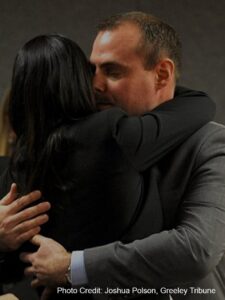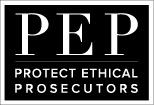Prosecutorial Misconduct: The Hidden Crisis Behind the Robes
By: Iris Eytan, PEP Founder and CEO

Who decides whether a prosecutor has committed misconduct? Technically, it’s the judges. But what happens when those judges disagree with the defense—even when the facts scream misconduct? Does that mean no misconduct occurred?
And what if a prosecutor’s office learns that one of their own acted unethically or unlawfully, yet they choose to do nothing? Does silence equal innocence or complicity?
What if a man—after 30 years in prison—is finally released because it was discovered the prosecutor withheld evidence of his innocence, but his release is conditioned on one thing: He must never publicly blame the prosecutor. Does that erasure make the misconduct disappear?
These are not hypotheticals. These are the daily realities—and they expose a dangerous flaw in the way the U.S. legal system tracks and reports prosecutorial misconduct. The current data only reflects cases where a lawyer exhumes the truth after years, and a judge is brave enough to agree the prosecutor lied or withheld evidence. But what if they aren’t?
Prosecutorial Misconduct Is Rampant — Not Rare
Prosecutorial misconduct is far more common than the official record suggests, with thousands of cases documented throughout the United States. I’ve seen it up close again and again as an attorney, defending my clients in court. Here are just a few of those clients I’ve defended:
- A 19-year-old young man with severe disabilities was falsely accused of sexual assault despite the only DNA and forensic evidence pointing away from my client and toward two alternative suspects. Unbelievably, the elected District Attorney at the time dismissed the importance of that evidence, claiming: “with the low-cut jeans that girls wear, she could have picked up anyone’s DNA off any surface her panties touched while they may have been riding up above her pants […] a bus seat, someone’s toilet seat if she did not pull them down far enough.”
- John San Agustin, a former Commander with the El Paso County Sheriff’s Office, was wrongly indicted in what appears to be retaliation for exposing misconduct in a high-profile murder investigation and for refusing to provide false testimony against the Sheriff. During the grand jury proceedings, prosecutors allowed both lay and law enforcement witnesses to present false testimony regarding San Agustin’s alleged involvement in the case. Under Colorado law—as in most states—defense attorneys are barred from participating in grand jury proceedings, giving prosecutors broad discretion to present or withhold evidence as they see fit. Eighteen months after securing the indictment, and just six weeks before trial, prosecutors abruptly dismissed the case with prejudice. Although a justification was given, it lacked credibility and failed to account for the serious misconduct that had occurred throughout the process. Although the charges were dropped, the damage to San Agustin’s life and reputation was profound—and permanent.

PEP CEO Iris Eytan hugs client Barry Morphew after his case was dismissed. Photo credit: The Denver Post
- Prosecutors charged Micah Kimball, a successful architect, and Barry Morphew, a high-end landscape contractor with Murder in the First Degree. In both these cases, while they sat in jail, prosecutors concealed favorable and evidence of innocence from the judge and defense. The prosecutors were eventually sanctioned for egregious misconduct. Kimball and Morphew’s cases were dismissed or acquitted, but the irreparable damage to their careers, families, and reputations continues to be long-lasting.
- Cole Stewart, a young college student, was wrongly convicted and jailed for felony menacing police officers based on flimsy evidence and a biased investigation. Stewart was later exonerated after the Colorado Court of Appeals found numerous errors, including that the prosecutor introduced false information into the trial.
Even when faced with undeniable evidence of misconduct, some judges refused to sanction prosecutors or report them for their misconduct. And while they looked the other way, their silence doesn’t erase the misconduct. Prosecutorial abuse doesn’t vanish just because it’s ignored—it happened, and it matters. And it’s that misconduct, clear and indefensible, that demands accountability.
Why Does Misconduct So Often Go Untracked?
Most misconduct never appears in official statistics. That’s because those numbers only reflect what courts or oversight bodies—many of whom are reluctant to call out their own—choose to acknowledge. Hidden, ignored, or bargained-away wrongdoing remains invisible.

Tom Fallis and Iris Eytan after Fallis was acquitted.
Consider another person I defended, Tom Fallis. He was a young father whose life unraveled after his wife’s suicide. Though the death was ruled a suicide, prosecutors—under media pressure and to appease his wife’s family—indicted him for murder two years later. Yet, more than a year before the indictment, the Assistant DA wrote to the Colorado Attorney General’s Office and multiple involved law enforcement officers (witnesses at trial), stating there wasn’t even probable cause, let alone proof beyond a reasonable doubt. This critical email was never disclosed to the defense—it surfaced only during trial thanks to a whistleblower.
After a grueling month-long trial, a jury of twelve acquitted Tom in just three hours. But by then, he had already spent years in legal and emotional purgatory. The judge showed no concern for the withheld evidence, and the prosecutor faced no consequences. In fact, he was later elected District Attorney. This kind of misconduct? It’s not tracked. It’s buried.
We must put a stop to these hidden stories of misconduct. No more cover-ups, soft discipline, and career promotions of prosecutors who bend and break the law. DAs take an oath to seek justice—not to commit misconduct to obtain a conviction.
Integrity Isn’t Optional — It’s the Job

Barry Morphew, his family, and Iris Eytan after Morphew’s trial was dismissed. Photo Credit: The Denver Post
PEP believes in accountability and justice. We believe people who commit crimes should be prosecuted—but the prosecution must follow the law. Integrity is not a luxury—it’s the bedrock of public trust. Without it, the system is just a game where the rules bend to justify the result.
We cannot keep ignoring the double standard where “winning” overshadows justice. Prosecutors wield immense power, and when that power is misused, lives are destroyed—with ease, and often with impunity. At PEP, we’ve said enough is enough—and it’s time you did too. Change starts with us.

